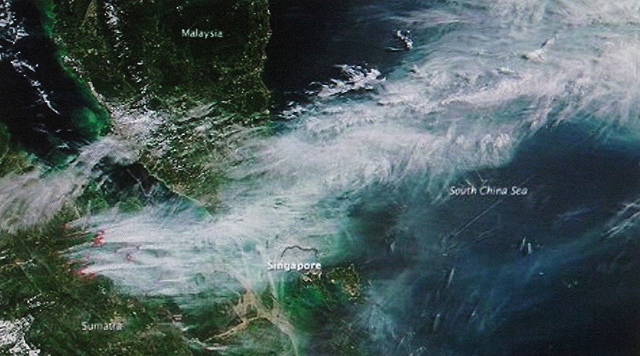Search
Recent comments
- delayed food....
1 hour 23 min ago - free expression....
1 hour 46 min ago - macrolympicus....
3 hours 15 min ago - obsession....
4 hours 21 min ago - forever....
4 hours 46 min ago - no recall...
5 hours 54 min ago - whacked bushmaster....
8 hours 1 min ago - american delusions....
11 hours 53 min ago - weaponry....
12 hours 51 min ago - REVEALED: THE PENTAGON’S
13 hours 8 min ago
Democracy Links
Member's Off-site Blogs
forest fires...

Malaysia has declared a state of emergency in two southern districts after smog triggered by forest fires in Indonesia reached hazardous levels.
The coastal towns of Muar and Ledang are in shutdown, and residents have been advised to stay indoors.
Air pollution has also worsened in the capital, Kuala Lumpur, shrouding its landmark Petronas Towers in hazy smoke.
Malaysia's environment minister is to meet his Indonesian counterpart on Wednesday to discuss the problem.
Smog has become an annual problem in Malaysia, but this is the first time in eight years that a state of emergency has been called, the BBC's Jennifer Pak, in Kuala Lumpur, reports.
People are angry that the authorities have not been able to address the health hazard, our correspondent says.
- By Gus Leonisky at 23 Jun 2013 - 10:43pm
- Gus Leonisky's blog
- Login or register to post comments
apologies about smoke...
Indonesian president Susilo Bambang Yudhoyono has apologised for the choking smoke that has spread from illegal fires in his country to Singapore and Malaysia.
Singapore's pollution index have hit record levels in the past week, and Malaysia has declared a state of emergency in two areas.
Indonesians living near the blaze are also suffering.
The president says the national disaster management agency is taking over command of the on-ground efforts to put the fires out and the police and military will be called in.
"As the president of Indonesia, I apologise for what has happened and ask for the understanding of the people of Malaysia and Singapore," Mr Yudhoyono said.
"We accept it is our responsibility to tackle the problem."
His apology comes days after he accused Singapore of "acting like a child" over the issue.
The fires burning in hundreds of hectares of peatland have triggered Singapore's worst environmental crisis for a decade, with acrid smoke shrouding residential buildings and downtown skyscrapers.
http://www.abc.net.au/news/2013-06-25/indonesian-president-apologises-over-choking-smog/4778634
the story of google earth...
It’s a safe bet that few people who have grown up in the Google era have ever heard of Stewart Udall. A U.S. Representative of Arizona’s 2nd Congressional District from 1955 to 1961, Udall left the House to become Interior Secretary under Presidents Kennedy and Johnson. That was pretty much it for his time in the public eye — not exactly an icon of the wired generation, right?
But in 1966, Udall and his staff had an idea. For all the attention the then budding space program was devoting to other planets, our own was being overlooked. If humanity wanted to protect its threatened natural resources, we first had to be able to keep an eye on them. That meant a satellite or, preferably, multiple satellites that could maintain a steady downward gaze, tracking habitat destruction, urbanization, industrial sprawl and more. Udall’s concern gave rise to Project EROS (Earth Resources Observation Satellites), later renamed Landsat. For all the bad and misguided ideas that came out of the 1960s, this scheme turned out to be very, very good.
Since NASA launched the first Landsat satellite in 1972, the program has been in constant operation. Seven other satellites followed the first into orbit over the years, sometimes replacing ones that had reached the end of their operational life, sometimes joining ones still in operation. The most recent member of the fleet, Landsat 8, went aloft in February. At an altitude of 438 miles (705 km), the satellites make one orbit of Earth every 84.3 minutes. Keep that up for 41 years, maintaining a photographic record of your travels, and you compile a whole lot of pictures — millions of them, which have since been digitized into petabytes, or billions of bytes of data.
http://world.time.com/timelapse/#chapter3
One important part of this photographic observation is to note the clear impact of humans on this planet...
illegal fires...
Smoke from huge Indonesian forest fires has created a cloud of smog over the country, which has spread over neighbouring Malaysia and Singapore.
The fires, which happen every year, are caused by slash-and-burn clearances on the islands of Sumatra and Borneo. Paper and palm oil companies have been widely blamed for the practice.
The Indonesian government has repeatedly promised to stop the illegal fires, without success.
http://www.bbc.com/news/world-asia-34242311